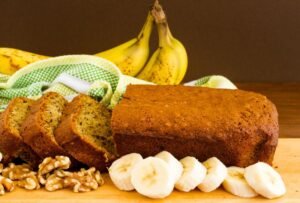Is homemade banana bread more eco-friendly than store-bought versions?

Is homemade banana bread more eco-friendly than store-bought versions?
Introduction to the Eco-Friendliness of Homemade Banana Bread
You’ve probably been there, standing in the grocery aisle, wondering whether it’s better to purchase store-bought banana bread or make it from scratch at home. While taste and convenience might be the most obvious factors that come to mind, there’s another perspective to consider as well: eco-friendliness. As it turns out, homemade banana bread may have a lesser environmental impact than its store-bought counterpart.
Understanding the Environmental Impact of Store-Bought Banana Bread
First, it’s crucial to understand the ecological cost of store-bought banana bread. Broadly, this involves several factors: production, transportation, packaging, and waste.
Production
Industrial food production can be a significant contributor to greenhouse gas emissions. These emissions come from the energy consumed to run the factory, refrigeration equipment, and machinery involved in bread making.
Transportation
After being produced, the banana bread then has to be transported to various retail stores. This typically involves trucks, which operate on fossil fuels, thereby further contributing to air pollution and climate change.
Packaging
Commercially-produced banana bread is almost always sold in plastic or other non-reusable packaging. This increases the accumulation of non-biodegradable waste in our environment, endangering wildlife, and contributing to environmental pollution.
Waste
Finally, when unsold banana bread reaches its expiration date, it must be disposed of, adding to food waste that will decompose in landfills, releasing harmful greenhouse gases.
Why Homemade Banana Bread Is More Eco-Friendly
Now, considering the environmental impact of store-bought bread, let’s explore why homemade banana bread might be a better choice.
Raising Awareness about Food Waste
Banana bread is a classic way to use up overripe bananas that might otherwise end up in the trash. By making your banana bread at home, you are combatting food waste, which is a significant issue in the U.S and globally.
Reduced Packaging
When you bake at home, there’s no need for the single-use plastic wrapping typically found in commercial bread. Instead, you can store your homemade loaf in a reusable container, reducing waste.
Saving Energy
Making one batch of bread in a home oven consumes much less energy compared to mass-production in a factory. Plus, there’s no need for additional refrigeration or the gasoline for transport trucks, further reducing the carbon footprint of your loaf.
How to Make Your Homemade Banana Bread Even More Eco-Friendly
Making banana bread at home is already more eco-friendly than buying it from the store, but there are steps you can take to make your baking even greener.
- Compost your banana peels: Instead of throwing them away, add your banana peels to your compost pile.
- Choose local and organic ingredients: Doing so helps support more sustainable farming practices and reduces the need for long-distance food transportation.
- Use energy-efficient appliances: If possible, use energy-saving devices, like a convection oven, which uses about 20% less energy than a regular electric oven.
Conclusion: Is Homemade Banana Bread More Sustainable?
In the debate between homemade vs. store-bought banana bread, it’s clear that homemade comes out on top in terms of sustainability. Not only can it save energy, reduce waste, and limit your exposure to single-use plastics, but making your own banana bread also allows you to support local farmers, enhance your baking skills, and enjoy a healthier treat fresh from your oven. So next time you’re in the supermarket aisle, consider opting for a bundle of bananas instead of the pre-packaged banana bread. Your taste buds — and the planet — will thank you.

Learn More
Conclusion
In conclusion, homemade banana bread can definitely be a more eco-friendly option than store-bought versions. Not only does it reduce packaging waste, but it also minimizes transportation emissions. Moreover, you have complete control over the ingredients, allowing you to choose organic or locally sourced options that support sustainable farming practices. As such, making your own banana bread enhances your connection with the food you consume, offering an opportunity for mindfulness, sustainability, and respect for our planet. Encourage yourself to try and make this small change. The environment – and likely your taste buds – will thank you.
FAQ
1. Why is homemade banana bread more eco-friendly than store-bought?
Homemade banana bread is more eco-friendly because it reduces packaging waste, lessens transportation emissions, and allows you to source sustainable ingredients.
2. Does making banana bread at home save money?
Yes, homemade banana bread can be cost-effective because you’re able to use overripe bananas that might have been thrown away.
3. Can I use organic ingredients in my homemade banana bread?
Absolutely, using organic ingredients in your homemade banana bread not only makes it healthier but also more environmentally respectful.
4. What are the nutritional differences between homemade and store-bought banana bread?
Homemade banana bread can be healthier as you have control over the ingredients, and can limit the amount of sugar and unhealthy fats.
5. Can making homemade banana bread contribute to sustainability at home?
Yes, making homemade banana bread is a great way to reduce food waste and minimize dependence on plastic-packed commercial goods.
6. How does homemade banana bread reduce transportation emissions?
When you make banana bread at home, you’re reducing the need for the product to be transported from the bakery or factory to the store, thereby reducing carbon emissions.
7. How can making my own banana bread connect me to my food?
Making your own banana bread fosters a direct connection to your food, as you’ve control over the ingredients and the preparation process, enhancing the appreciation for your meal.
Is homemade banana bread more eco-friendly than store-bought versions?

When you make purchases through the links available on our site, we may receive an affiliate commission at no additional cost to you.



